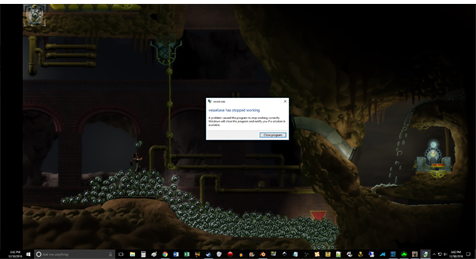Switch puzzle/physics games have always had a special place in my heart. You can usually find them piled next to things like my mental versions of political figures I dislike, or my memories of Star Wars Episode II–you know, things that I like to take out every so often when I’m bored in my head and burn just for fun. It took very little time for me to determine that Vessel would be added to this pile.
Yes, I’m a little (maybe a lot) biased. I did just admit that I don’t like these kinds of games–but maybe let me explain a bit about Vessel and myself, and you may understand why.
Vessel is inherently a game where you play as some nameless white guy who runs around and hits switches and pulls levers. I suppose he has some backstory of being some great inventor, but it doesn’t really matter to the game at all. I could have been playing as Calvin, the bag-boy from the local grocery store, and the game wouldn’t have changed much. In fact, I think I’ll just start calling the inventor Calvin. At least it makes *me* laugh.
So Calvin is sitting in his lab, possibly reminiscing about his past achievements–the invention of a strange aquatic creature called “Fluorous”–when one of the Fluorous lock him out of his lab, leading him on an… “adventure” (by the loosest definition of the word)… where he must get back into his lab. Along the way, he’ll hit switches. He’ll open doors. He’ll pull levers and walk through more doors. If you’re lucky, you’ll get to spray water at something in random orders until, eventually, it might open another door. This inherently is the problem with most puzzle games in general but specifically Vessel–what is my motivation? What is my goal? Why do I care? I know nothing of the character, he isn’t that likeable, the Fluorous aren’t really interesting, and after 5 minutes I already know exactly the kind of game I’ll be playing.
“Oh, but what of the water physics? They’re neat, aren’t they?” I suppose to some degree they are, but what does it matter? I’ve never understood why physics justify the existence of a game. Physics are simply that–physics. Companies sell physics engines, but gamers don’t *buy* physics engines, and most puzzle games are essentially just that–an excuse to display a physics engine. If I wanted physics, I’d walk onto my porch a drop a rock off my balcony. “Does gravity still work? Yep, it does.” Fascinating.
One might argue that Vessel displays impressive, or at least “stylistic” artwork. To some degree, this is true–while the design did not appeal to me at all, I can recognize that work was put into the game’s visuals, lighting and layout. While the rooms are basically boxes with switches and buttons, they do try their best to appear interesting, with pipes running everywhere, cave-work in the background, and dynamic shadows/lighting. Yes, one might say that the game is “artistic” or “beautiful.” I could also tell you that the Sistine Chapel is “artistic” and “beautiful,” but I wouldn’t tell you that it makes the Sistine Chapel a good video game.
I guess the biggest crux I have with Vessel and most puzzle games, is that I have to ask the question, “Why?” Why would I want to do this? If you stripped away the graphics–if you stripped away the lighting and soothing music–the actual game “experience” is equivalent to someone locking you in an empty white room filled with buttons and switches, and a PA box overhead says “you can leave when you figure out how to open the door,” and at that point it’s up to me find the correct order to hit all the switches and pull all the levers. Yes, there are generally clues, and yes it exercises problem solving–but so does a textbook–and ultimately at the end of the day, I’m just implementing procedural inputs into a linearly designed path that I have to follow to get to the next set of required procedural inputs and on and on until I can finally see the credits roll. Being a stubborn gamer, I usually do just that–however this time, I decided to break the mold and find my own escape from the crushing loneliness of the underground steam maze.
Once I obtained the ability to create Fluorous seeds, I soon discovered that the game allowed you to create an infinite amount of them–better yet, it did not despawn the old seeds. Thusly, I set out to see how many seeds I could create before the game crashed. In truth, I had more fun swimming through my seed sea than any experience I had solving Vessel’s puzzles. After 15 minutes or so, the game crashed, and I finally had my freedom.
